When choosing a smart virtual assistant for your home, the options can seem overwhelming. Two popular choices on the market today are Google Assistant and Amazon’s Alexa. But what are the differences between the two?
Google Assistant, powered by Google’s vast knowledge graph, excels in answering questions and providing information. It’s especially handy for those who regularly use Google services and products, from Gmail to Google Calendar. On the other hand, Alexa is known for its vast home automation capabilities, with a wide range of compatible devices and seamless integration with Amazon’s shopping services.
Both virtual assistants have their strengths and weaknesses, and ultimately, the choice comes down to personal preference and which features are most important to you. Whether controlling your smart home devices or finding the answer to a trivia question, Google Assistant and Alexa can provide a helping hand. But, ultimately, it’s up to you to decide which is the best fit for your home and your needs.
Google Assistant Features
As a powerful virtual assistant, Google Assistant offers many features that make it a strong competitor in the battle between Google Assistant vs Alexa.
Here are some of the key features of Google Assistant:
- Google Integration: Since Google Assistant is part of the Google ecosystem, it can seamlessly integrate with other Google services like Google Maps, Google Calendar, Google Photos, and more. This allows for a more personalized and seamless experience.
- Voice Recognition: Google Assistant boasts excellent voice recognition capabilities, even in noisy environments. In addition, it can recognize different people’s voices and tailor responses accordingly.
- Multiple Languages: Google Assistant supports more than 30 languages, making it a great option for multinational households or businesses.
- Smart Home Control: Like Alexa, Google Assistant can control various smart home devices, from lights to thermostats. However, it also supports a wider range of devices, including Google’s Nest line.
- Superior Knowledge Engine: Google’s search engine is renowned for its accuracy and comprehensiveness, and Google Assistant leverages this with its Knowledge Engine. This means it can answer various questions with reliable and accurate information.
- Continued Conversation: Another nifty feature of Google Assistant is its ability to continue conversations without saying “Hey Google” every time. This makes for a more natural and flowing conversation with Assistant.
Overall, Google Assistant has an advantage in its excellent voice recognition, integration with Google services, superior knowledge engine, and multilingual support.
Google Assistant vs Alexa
One of the notable features of Alexa is its ability to integrate with a vast array of smart home devices. With Alexa, users can control various technologies, including thermostats, lights, and electronic locks, by simply using their voice. Also, the platform supports thousands of third-party skills that enable Alexa to perform additional tasks and activities, such as ordering groceries, booking an Uber or Lyft, and even playing games.
Alexa also has a feature called “Drop-In” which permits you to hasten a call to another Alexa device without needing the recipient to answer. This feature is useful in scenarios like checking up on a relative or infant upstairs without shouting up or down the stairs or against any background noise.
Furthermore, Alexa offers a feature similar to Google’s “Broadcast” feature, which enables users to send messages from one device to another in the same residence. This is useful for communicating to family members without shouting across the house.
Another feature of Alexa is its exceptional music playback capability. Alexa supports services like Spotify, Pandora, and Apple Music, and users can utilize multiple Alexa-enabled devices in their households or offices to create a whole-home audio system. In addition, you can request music playback, skip tracks, and even adjust the volume using simple voice commands with Alexa.
While both Alexa and Google Assistant have pros and cons, Alexa has a clear advantage in terms of its capability to integrate with a diverse range of devices, its vast array of third-party skills, and its exceptional music playback feature.
Comparison Between Google Assistant and Alexa
Regarding smart home assistants, Google Assistant and Alexa are two of the most popular available options. However, while both of them have similar functionalities, there are some key differences you might want to consider before choosing one.
Here’s a breakdown of the main differences between Google Assistant and Alexa:
Speech Recognition and Language Support Both Google Assistant and Alexa have high-quality speech recognition, but Google Assistant is known to better understand context in human speech.
Additionally, Google Assistant supports more languages than Alexa. While Alexa supports English, German, Japanese, French, Italian, and Spanish, Google Assistant supports over 30 languages.
Integration with Other Devices: These smart home assistants allow you to control several smart home devices, such as lights, thermostats, and speakers. However, Google Assistant is known for its seamless integration with Google Home devices and other Google services. So, if you are a fan of Google’s ecosystem, Google Assistant might be the way for you.
On the other hand, Alexa has a larger device compatibility list, which includes devices from popular brands such as Philips, Belkin, and WeMo. So if you already have several smart devices at home, Alexa might be a better fit for you.
Third-Party Integration Regarding third-party integration, Google Assistant and Alexa offer integrations with popular apps such as Spotify, Uber, and Pandora. However, Alexa has a larger list of third-party integrations and skills, making it more versatile in app integration.
Voice Customization: Both Google Assistant and Alexa offer users different voices and tone customization. However, Google Assistant offers more options in terms of voice customization, including celebrity voice options.
Privacy In terms of privacy, both Google and Amazon are known to collect data from their users to improve their services. However, Google Assistant allows you to delete your data history easily, where Alexa requires you to use a web browser or the Alexa app to manage your data.
Choosing a smart assistant between Google Assistant vs Alexa ultimately depends on your preferences, existing devices, and needs.
